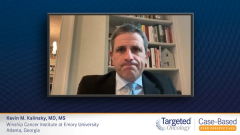
Novel Targeted Strategies in HR+/HER2- Metastatic Breast Cancer
Key opinion leader Kevin Kalinsky, MD, MS, shares insight to recent and ongoing clinical trials with novel targeted therapies in the setting of HR+/HER2- metastatic breast cancer.
Episodes in this series

Transcript:
Kevin M. Kalinsky, MD, MS: At San Antonio last year, we saw the updated data from the EMERALD study [NCT03778931] that was presented by Virginia Kaklamani, [MD,] which demonstrated some subgroup analyses. I thought they were really informing of what we should be thinking about in practice, and the patients with ESR1 mutations, because elacestrant is only approved as a single agent in patients who have an ESR1 mutation. They looked at the subgroups as patients in terms of how long they were previously on their CDK4/6 inhibitor and endocrine therapy. The patients who’d been on their prior therapy for at least a year who really seemed to benefit from elacestrant compared to physician-choice endocrine therapy. In my clinical practice, when I think about utilizing elacestrant, again, only in patients with ESR1 mutations, I really think about it in patients who’ve been on their prior CDK4/6 inhibitor for at least a year.
Kevin M. Kalinsky, MD, MS: There are a number of studies that are ongoing with elacestrant. Potentially, elacestrant will be evaluated in the early-stage setting. There's also an ongoing study called ELEVATE [NCT05563220], which is looking at giving elacestrant along with various targeted therapies [such as alpelisib, everolimus,palbociclib, and ribociclib]. Right now, it’s only approved as a single agent in the context of ESR1 mutations. ELEVATE is going to be looking at [combinations] with other targeted agents like CDK4/6 inhibitors and PI3K inhibitors. These will be important data in terms of safety and some signal of efficacy.
Kevin M. Kalinsky, MD, MS: Right now, there are a number of agents in development in this endocrine therapy population. There are other SERDS [selective estrogen receptor degraders] that are in development, like camizestrant as well as giredestrant. Amcenestrant is no longer in development, but these drugs are being developed in various settings. In the metastatic setting, there are ongoing phase 3 trials. There are also studies in the early-stage setting. Some are being developed at the time that patients are starting their endocrine therapy. Some are also being developed once patients have been on their endocrine therapy for a couple of years. So, this field is actively changing and busy. There are also other endocrine therapies that are in development, like the lasofoxifene, which is an oral SERM [selective estrogen receptor modulator]. We saw this data at [the] ASCO [Annual Meeting] last year, which had some intriguing data of SERM plus lasofoxifene plus abemaciclib. This led to the phase 3 ELAINEIII study [NCT05696626]. This is comparing fulvestrant plus abemaciclib vs lasofoxifene plus abemaciclib in patients who have ESR1 mutations. There are other agents that are in development, like CERANs [complete estrogen receptor antagonists] and PROTACs [proteolysis-targeting chimeras] that are targeting the estrogen receptor in different sorts of ways. With randomized studies, we’ll see how this will all shake out.
Kevin M. Kalinsky, MD, MS: At San Antonio last year, we saw updates of AKT inhibitors with capivasertib in the CAPItello-291 study [NCT04305496]. It has now been reported that this drug is going to the FDA for approval. This agent was evaluated as fulvestrant with or without capivasertib. The data have been published in the New England Journal of Medicine. The interesting thing that we saw was a benefit of the AKT inhibitor, which is given 4 days on, 3 days off. We saw a benefit in progression-free survival in both the PI3K/AKT pathway altered population as well as the nonaltered population. We’ll see [whether] the FDA approves this agent, regardless of alterations in that pathway. The potential [adverse] effects of capivasertib include rash and potentially hyperglycemia and diarrhea.
Transcript edited for clarity.












































